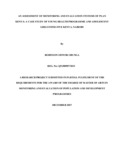An Assessment of Monitoring and Evaluation Systems of Plan Kenya: a Case Study of Young Health Programme and Adolescent Girls Initiative Kenya, Nairobi

View/
Date
2017Author
Obunga, Robinson O
Type
ThesisLanguage
enMetadata
Show full item recordAbstract
The overall objective of the assessment was to determine the status of the Plan International-Kenya Monitoring and Evaluation System, a case study on two Nairobi based projects; Young Health Programme and Adolescent Girls Initiative Kenya with the focus on eight components: resources and capacity building; documentation (plans, guidelines and operational documents); data collection and management; data quality systems; data verification; data analysis and use; evaluation; and alignment and leadership (FHI 360, 2013). Specifically, the assessment aimed at: identify strengths and gaps of Plan International-Kenya M&E System; determine the procedures of the Plan Kenya M&E System use to improve the programme and to give recommendations for Monitoring and Evaluation practice of Plan International-Kenya. On average, Plan International-Kenya Monitoring and Evaluation System scored 60.2 out of 100. The scores differed from one component to the other as analysed as follows: (highest to lowest); Documentation (Plans, guidelines and operational documents 72 percent, Data analysis and use 71 percent, Alignment and leadership 66 percent, Evaluation 64 percent, Data quality systems 49 percent, Resources and capacity building 48 percent, Data collection and management 42 percent, and Data verification 40 percent. In general, M&E System is at 60 percent and therefore, partially functioning according to the FHI, 360 (2013) standards.
Publisher
University of Nairobi
Rights
Attribution-NonCommercial-NoDerivs 3.0 United StatesUsage Rights
http://creativecommons.org/licenses/by-nc-nd/3.0/us/Collections
The following license files are associated with this item:

